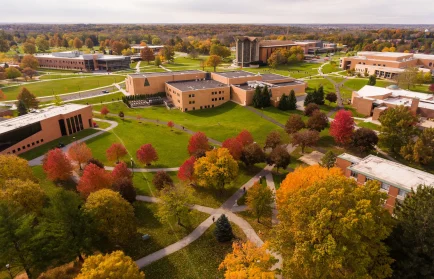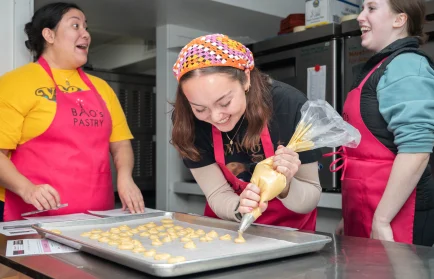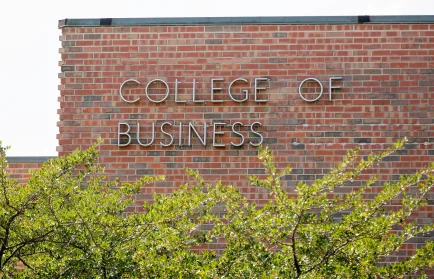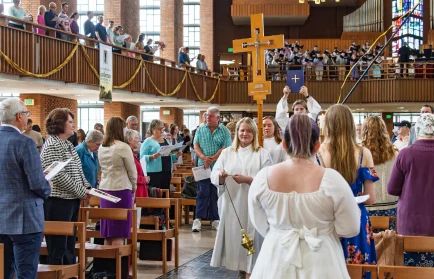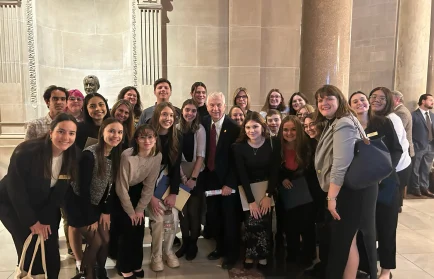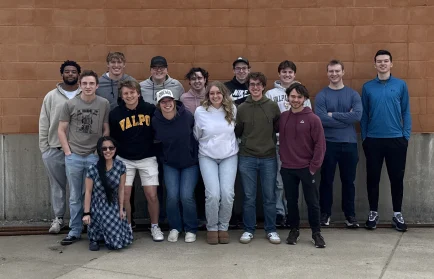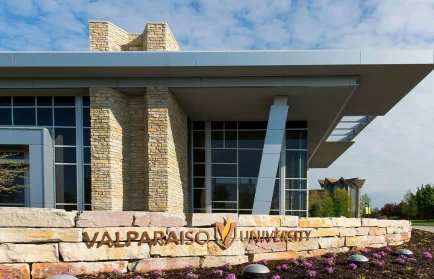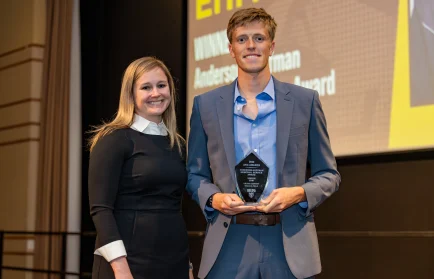Undergraduate Grants
There are several opportunities for students to receive grants from the Creative Work and Research Committee, these incude Guild Undergraduate Creative Work and Research Expense Grants and Undergraduate Summer Research Housing Grants
Undergraduate Research Grants Available
Click the button below to review the criteria that the committee will be using to evaluate the proposals.
Guild Undergraduate Creative Work and Research Expense Grants are awarded by the Creative Work and Research Committee two times a year. Funding for the grants is provided by the University Guild’s Student Research Endowment Fund.
The University Guild is an organization that was created in 1931 with the sole purpose of providing an enhanced learning experience for current Valparaiso University students. Members of the Guild include alumni and current and former parents of Valpo students. Each year the Guild funds campus gift grants, student research grants, and scholarships.
The motivation for these awards is to enhance and facilitate undergraduate research at Valparaiso University. Annually, $10,000 will be available in support of undergraduate research.
Student Expenses:
The funds will support up to about 10 awards with a soft cap of $500 each. If awarded, students could use these funds for equipment purchases, supplies, photocopying, or other research needs or travel, meals, or lodging to present their findings at conferences.
Student travelers will be reimbursed at the per diem rate of $40 for meals and incidentals. This will be allocated: Breakfast – $9, Lunch – $12, and Dinner – $19 for partial days. This will apply to all travel paid to or for the benefit of students.
Please note that a faculty sponsor must review each student’s proposal and agree to act as a resource person during the research project. Students can apply for this award more than once if the first award is for research supplies and the second, for example, is for travel to a conference to present the research findings. Funding for the second award will be contingent on completion of the research supported by the first award. Students may not obtain two awards to support their initial research.
Deadlines are set by the Committee. Specific dates can be found on the deadlines web page. Generally, the deadline for spring semester grants is the last week of October. The deadline for summer and fall semester grants is the last week of February. Funds may be spent as soon as students are notified of their award. Notification is typically within a few weeks after the application deadline.
Questions about the application format or the application submission form can be directed to the Office of the Provost.
Eligibility:
All full-time undergraduate students are eligible. Students need to indicate their intended graduation date on the application cover sheet. Students must be enrolled in classes during the time of any funded grant activities. For example, if a student receives a grant for summer research and he/she plans to graduate in May, the student must be registered for summer courses. This also includes conference travel post-graduation that is related to work from an earlier semester.
The Committee will give higher priority to original, student-initiated research proposals as opposed to student work on faculty projects. Nevertheless, the Committee encourages proposals of all types.
Each undergraduate research grant proposal should follow the format below and submit separate documents for items I – III:
I. Abstract
Please provide an abstract of 200 or fewer words.
II. Project Description
Applicants will briefly describe the project they envision, with enough detail to provide a clear picture of the project but without technical or specialized description which would obscure the description’s clarity.
Applicants should give special attention to the following:
- The purpose of the project: What are the objectives? What theoretical framework, if any, underlies the project? Is this a student initiated project or is it part of a larger faculty project? If this is a part of a faculty project, then what is the relationship between this specific project and the larger research project? If you are requesting travel funds, why do you have to go to this specific location to do or present this research?
- The significance of the research: What is the value of this research? Why does it matter? How will it add to what is known about this subject? To what audiences does this matter and why?
- The plan of work: What is the timetable for the work? What special tasks or processes will be involved?
- Anticipated results: If all goes as planned, what can be the expected outcome of the project, and how will it enhance teaching or learning? How will you ensure that the information learned from this project does not end with you? In other words, what is your dissemination plan for what you learn?
III. Budget
A brief, but specific, statement of how the grant will be spent (i.e., equipment, materials, stipends, travel, etc.)
IV. Faculty Sponsor
The student should identify a faculty sponsor who will review the student’s proposal and agree to act as a resource person during the research project. A letter of support from the faculty sponsor is no longer required as part of the student’s application. Instead, once the student has submitted his/her application, the faculty sponsor will receive an email request to review the proposal and then complete the Undergraduate Research and Creative Work Rating Form in lieu of a letter of support.
All applications and supporting documentation must be uploaded as a PDF file using the appropriate online submission form.
During the spring semester, the Creative Work and Research Committee is charged with awarding housing to undergraduate summer research students. The committee receives information from Residential Life about the minimum number of beds that are predicted to be available. The committee prioritizes requests for summer housing if requests exceed available beds. The committee will award housing only up to the number of available beds. If more beds become available, additional students may be awarded housing later in the spring. The number of available beds will change from year to year due to the number of camps or conferences taking place on campus over the summer.
The CWR Committee considers the following in their deliberations:
- Priority is given to students doing research funded by grants.
- The committee prioritizes students who do not have alternate local housing options over students who could make alternate arrangements (e.g. commuting from home, beginning an academic-year lease early, or other local options). However, students who have alternate housing options will not automatically be disqualified.
- The committee prioritizes named housing applicants over applications for “student to be determined later.” However, students will not be automatically disqualified if they are named later in the housing allotment process.
Summer research students must meet the following criteria:
- Each student must be a registered undergraduate at Valparaiso University during the spring semester prior to the experience.
- Each student must be engaged in full-time research (at least 30 hours per week) while receiving the housing grant, up to a maximum of twelve (12) weeks.
- Each student researcher must have a faculty mentor.
- Each student must be engaged in research or creative work, as opposed to simply assisting with a faculty research project. For example, a student employed by a faculty member to work solely as a laboratory technician, to find journal articles in the library, or to proofread a manuscript would not be eligible for a Summer Research Housing Grant. The key criterion in defining research or creative work is that the student be engaged in, and contribute to, the intellectual development of the research or creative project. Two manifestations of such engagement are: 1) that the student write a comprehensive research report, and 2) that the student be included as a co-author of any scholarly publications that result from the research.
Students who wish to be considered for a Summer Research Housing Grant should ask their faculty mentor to complete a CWRC Summer Research Housing Grant Form by the last week of March. The specific date can be found on the deadlines section of the Faculty Guidelines and Procedures page.
Faculty mentors will need to provide the following information on the form:
- The student’s name and ID number.
- Expected graduation date.
- A short description of the student’s planned activities.
- Beginning and ending dates for the research/housing.
- The source of funding from which the student will be paid, if applicable. Lack of pay does not necessarily disqualify a student.
- Whether the student has other options for housing if free housing is not available due to space limitations.
- If this project involves multiple students or multiple faculty members, please explain the context.
The Committee on Creative Work and Research will review the submitted forms and select students to receive Summer Housing Grants before mid-April. The Office of the Provost will inform Residential Life, faculty mentors, and students about the committee’s decisions.
These awards are subject to the following additional conditions:
Faculty who anticipate receiving external grant funding prior to the end of the spring semester and wish to house student researchers in University housing, must submit a letter of request to the Committee on Creative Work and Research by the deadline (student may remain unnamed if unknown at that time). Late requests are strongly discouraged and may not be honored.
Students enrolled in summer school must have the approval of the Financial Aid office in order to be eligible for this housing award.
Students receiving this award must abide by all the rules and regulations of the residence hall system.
Students must complete and submit a summer housing agreement form to the Residential Life office in the Harre Union by no later than the summer school housing application deadline. Students should indicate that they are a “summer research student” on the form itself. If students are not approved for free housing, and then wish to cancel their housing, they may do so without financial penalty.
Grants will be for up to twelve (12) weeks. When not on campus for one week or more, students must vacate their rooms.
Rooms will be double rooms with roommates assigned by the Housing office. Meals are not included in these awards.
